Politics at Glastonbury a 'festival within a festival'
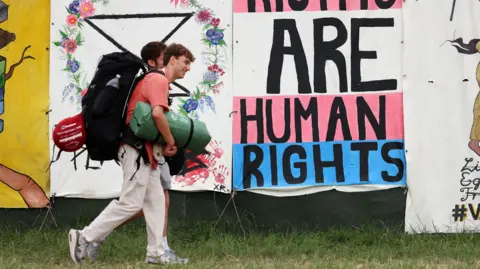 EPA
EPAAs Glastonbury Festival enters its final day, with performances from Rod Stewart and Olivia Rodrigo to look forward to, so too is its political programme.
While the festival has changed beyond recognition from its free-flowing, flower power roots, it has tried to retain its political edge, which is unashamedly left-wing.
The site is covered with messages about climate change, environmental activism, international aid and human rights. Speakers this year include Gary Lineker, Deborah Meaden and a hustings for the leadership hopefuls of the Green Party.
Founder Michael Eavis reportedly told journalists this week that people who do not agree with the politics of the event "can go somewhere else". But what do those who are at the festival think of its ideas and values?
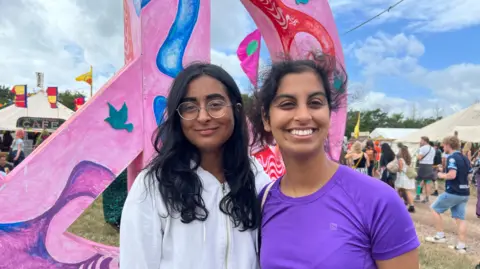
Stood in front of a huge CND (Campaign for Nuclear Disarmament) sign in the Green Futures part of the site, Noma said: "As someone who is active on the climate space, for me it's really inspiring being in this sort of area."
It is here that the festival most retains its 1970s roots, with workshops, political talks and messages supporting environmental activism.
"It's like a festival within a festival," Noma adds.
"I think Glastonbury has a reputation for being a hippy festival," said her friend Samerine.
"But there's a lot of cool stuff around and loads of information and people are getting to learn things here."
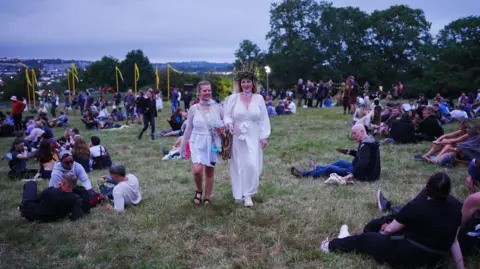 PA Media
PA MediaThe festival has long championed environmental causes, and slogans about the climate crisis can be seen all around.
It's also true however that today's Glastonbury attracts the mega-rich, some of whom arrive on helicopters.
For political commentator and author Ash Sarkar, another speaker at the festival this year, this is a problem.
"When it comes to the helicopters and yurts, not only do I find that disturbing in terms of ostentatious displays of wealth, you're also missing the best part of being here," she said.
"You've got thousands of people having a good time together, a collective experience. So if you want to avoid all that, not only are you a mug for spending that much money, you're not going to have a very good time."
Speaking to BBC Politics West, former conservative MP Jacob Rees-Mogg, said he would not enjoy Glastonbury Festival, which he added "isn't my scene".
"I'd rather go frankly to Glyndebourne," he said.
Asked what a festival for people right of the centre would look like, Rees-Mogg replied: "Oh, it would probably be mock battles from the civil war and little bit of jousting, that sort of thing."
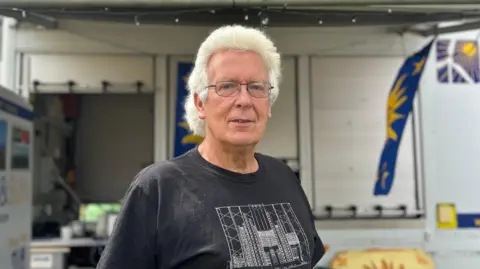
Back in Glastonbury, Chris, from Oxford, went to the first event at Worthy Farm, then called Pilton Pop, Folk and Blues Festival, held in 1970.
"I was at Catholic boarding school. I bunked off and wandered around carrying my school uniform in my bag. It was completely free and anarchic," he said.
"It completely changed my life. A lot of the stuff that was being talked about 10 years ago is now mainstream.
"People thought you couldn't run a stage on renewable power, now it's really quite easy to do.
"Whilst the music has diversified incredibly over the past 20 years, the politics here remains steadfastly left-wing."
Should the festival though become more welcoming to those with other political views?
"There's probably a few Tories here, a sprinkling of Reform," Chris said.
"But this is about positive joy, fun, progress and creating a better world. Quite a lot of that tends to align with the left."
Ms Sarkar agrees.
"You can't have everything for everyone," she said.
"If you want, you can set-up your own Reform music festival and I'm sure the ever entrepreneurial Nigel Farage has considered it."
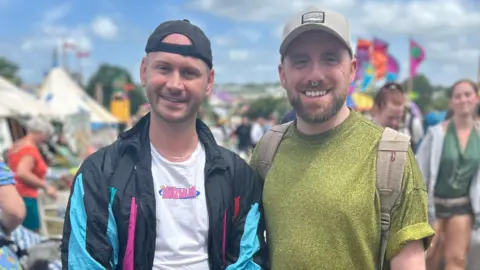
For Jason, from Manchester, and Rowan, from Leeds, who are both part of the LGBT (lesbian, gay, bisexual, transgender) community, the idea of being amongst similarly minded people having a good time, is part of the point of the festival.
While waiting to be served a cream tea, they said there are two different sides to the festival, "the intense and the really wholesome".
"A lot of us and our friends are very friendly, welcoming, open-minded people," said Rowan.
"It's not just like-minded people, it's acceptance. You can be who you want here and the way people dress or hold themselves is incredible."
Follow BBC Somerset on Facebook and X. Send your story ideas to us on email or via WhatsApp on 0800 313 4630.
